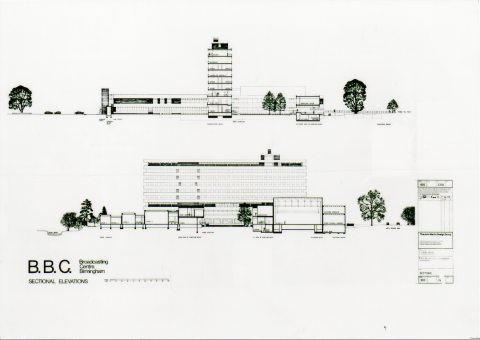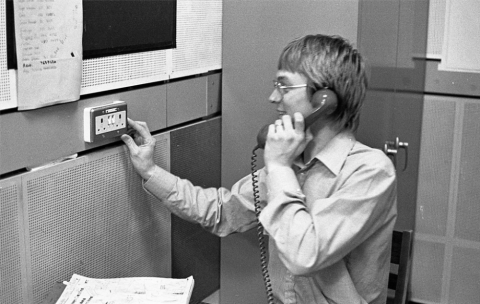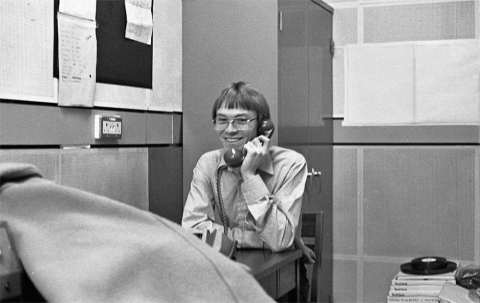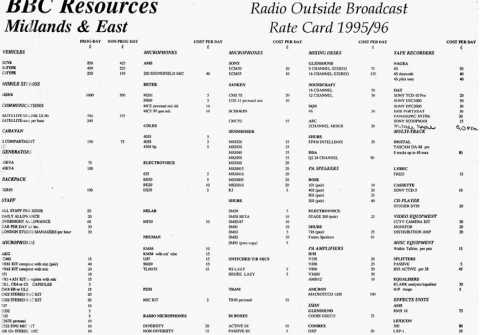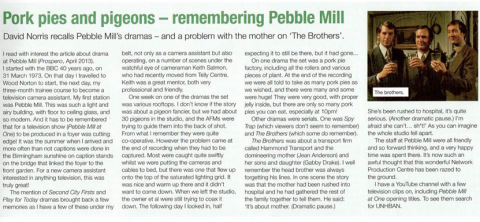Conditions of service
A quirk of the conditions of service at that time, was the ability to take overtime as time in lieu, so that if you worked an hour’s overtime which would normally be payable at 1.25 T you could take the 1T as time in lieu, and just be paid the 0.25T. I made quite extensive use of that option when I was not short of money, as one cannot be taxed on time in lieu, but later with a growing family money became quite important. However I cannot compare to the master of the system Elson Godbolt. As he was part of the O.B. rotation he tended to get a lot more overtime than I did based largely in the studio, and he managed to amass weeks of leave, and around every 2 years, put this together with his annual leave and PHL leave, and took 3 months off during the winter season, on full pay. It was a good job no-one else wanted much leave at that time or it would have broken the system. If all the staff had taken all overtime as time in lieu, there would not have been enough staff to cover all the requirements, as no-one would ever have been working for more than their basic hours in any one year, and the staffing levels were such that some overtime was almost inevitable, especially as some studio sessions would overrun.
Other payments included extra payment if you worked on a public holiday, 2T for working on Christmas day, payments for working over 12 hours, payment for a less than 10 hour break between duties. All of these were intended to discourage scheduling staff for unreasonable duties, but for occasions like Election Night, where staff quite often ended up working though for 24hours at some O.B. sites, they were laughing all the way to the bank!
The engineering staff both in operations unit, and engineering services, were (as far as I am aware) all on irregular hours working conditions, which attracted a 15% lift on basic salary. In some areas many of the staff worked quite regular shift patterns and some even worked days patterns, but to maintain flexibility in moving staff around all were given the same irregular hours conditions. This may have caused some disquiet among some staff they worked alongside who were on normal days conditions and therefore flat rate salary, but I was never aware of it becoming an issue, it was just seen a a quirk of the system. The downside was that non of these extra payments counted towards pensions, so people used to receiving a lot of them, could, on retirement, see quite a cut in their income. From what I have seen since leaving the BBC, pensions have got a whole lot worse!
Ray Lee

Ray Lee
The following comments were left on the Pebble Mill Facebook group:
Stuart Gandy: ‘Commenting on Ray’s mention of Elson Godbolt, I do remember that in my first weeks at pebble Mill at the start of 1980, I wondered who he was. By the time I had been there a few weeks I had probably met all the ops engineers except Elson. His name being on the rota as showing weeks and weeks of leave. Other allowances I remember back then were the MHW, or meal hour work-through. This was when you could get an extra payment if your meal time was disturbed. Then there was the sssa, soft soul shoe allowance which was meant to pay for footwear for people who had to walk on the studio floor. I think this was the massive sum of £4 when I started, and as far as I know, didn’t increase at all right up until it was abolished. It was quite a time consuming task though, filling in all the forms if you wanted to claim these things.’
Peter Poole: ‘And don’t forget meals over five at base. It was a small allowance with a luncheon voucher.’
Brian Johnson: ‘Wow, Elson Godbolt stirred a memory. Sorry this might be slightly off subject………however……When I transferred from London to my home town of Birmingham as a Technical Assistant in 1969, (pre-P.Mill) I had to do a few weeks in every engineering section. One of those was the film processing area at Gosta Green that dealt with all the News film each day. It was an unusually hot summer and we could not get the processing tanks down to the right temperature. I was being supervised by Elson and we had to buy in lots of ice to put into the huge tanks of developer and fixer to enable us to process the film. Midlands Today (I think it was called that then although I might be wrong) sent a camera crew to film us doing it and it went out on the news programme as part of the item on the unusual heat. We obviously managed to develop it ok!’
Pete Simpkin: ‘Brian as a former worker in News film processing in the BBC I can sympathise…we also had an annual maintenance weekend where we stripped the processor down and cleaned every tank and roller having to get it all up and working again by 9am Monday. Informal arrangements were made to cover any emergencies by having film processed at the local ITV studios should the need arise…it never did!’
